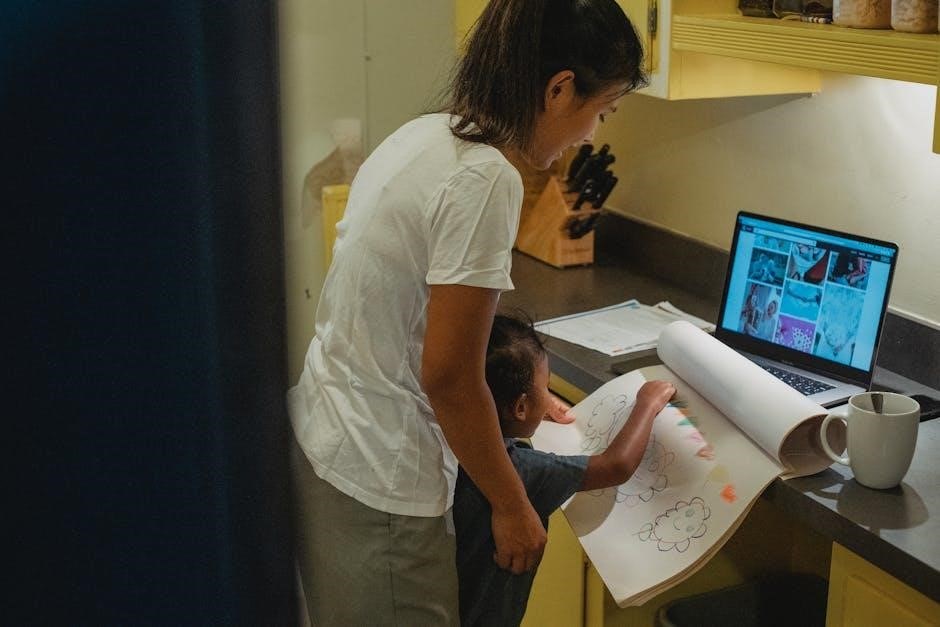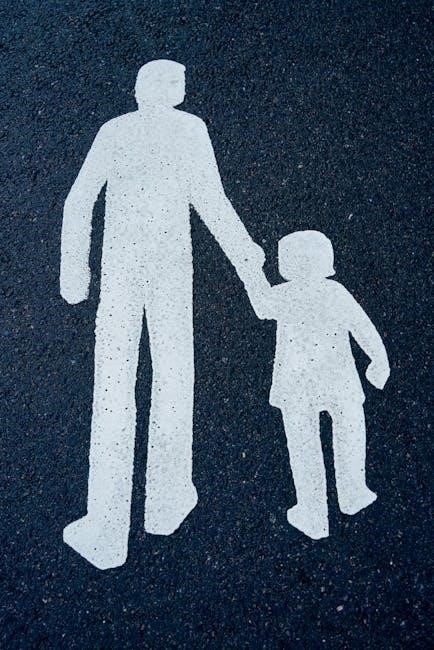In-school suspension (ISS) is a disciplinary strategy where students remain in school but are isolated from peers, focusing on academic work under supervision, aiming to maintain a safe learning environment while addressing misbehavior․
What is ISS?
In-school suspension (ISS) is a disciplinary approach where students remain in school but are placed in a supervised, isolated environment․ They complete academic assignments during this time, ensuring minimal disruption to their learning․ ISS is designed to address misbehavior while keeping students engaged academically and maintaining a safe, structured setting․ It is typically used for minor to moderate infractions, providing an alternative to out-of-school suspension․
Purpose and Goals
The primary purpose of ISS is to address student misbehavior while maintaining academic engagement․ It aims to provide a structured, supervised environment where students reflect on their actions, take responsibility, and complete assignments․ The goal is to help students understand consequences, improve behavior, and return to class prepared․ ISS also seeks to reduce out-of-school suspensions, ensuring students remain connected to learning and school community, fostering a safer, more supportive educational setting․

Types of Suspension
Suspension is a disciplinary action where students are temporarily removed from school; It can be short-term (up to five days) or long-term (six days or more), either in-school or out-of-school, depending on the severity of the incident and school policies․
Short-Term vs․ Long-Term Suspension
Short-term suspensions last five or fewer school days, often addressing minor misbehaviors, while long-term suspensions exceed six days, typically for serious incidents․ Short-term suspensions are usually managed by school principals, whereas long-term suspensions may involve superintendents․ In-school suspension (ISS) is often used for short-term cases, allowing students to continue academic work under supervision, reducing the need for out-of-school suspensions and minimizing educational disruption․
In-School vs․ Out-of-School Suspension
In-school suspension (ISS) keeps students in a supervised school setting, allowing them to complete assignments, while out-of-school suspension (OSS) sends students home, potentially disrupting learning․ ISS maintains academic engagement and supervision, whereas OSS may lead to missed work and falling behind․ Schools often prefer ISS to reduce OSS numbers and ensure students remain connected to their education, minimizing gaps in learning and behavioral setbacks․

Benefits of ISS Over Out-of-School Suspension (OSS)
ISS provides a structured environment for students to reflect on behavior while continuing academic work, offering support to prevent further misbehavior and promote growth․
Reducing OSS Numbers
In-school suspension serves as an effective alternative to out-of-school suspension, reducing OSS numbers by providing a supervised environment where students can reflect and learn without being removed from school․
Maintaining Academic Engagement
In-school suspension allows students to continue their academic work in a supervised setting, minimizing learning gaps and ensuring they stay engaged with their studies despite disciplinary actions, fostering continuity in education while addressing misbehavior․
How ISS Works
In-school suspension involves isolating students in a supervised setting within the school, where they complete academic assignments, maintaining a structured environment to address misbehavior effectively․
Structure and Supervision
In-school suspension typically involves a dedicated space where students complete academic assignments under close supervision by school staff․ The structured environment ensures minimal distractions, allowing students to focus on their work while reflecting on their actions․ Supervisors monitor progress, provide support, and enforce rules to maintain a productive and disciplined setting, ensuring students remain engaged in learning despite their isolation from peers․
Duration and Scheduling
In-school suspensions can vary in duration, ranging from a portion of a school day to several days, depending on the severity of the infraction․ A full-day ISS typically lasts from 9 a․m․ to 3:30 p․m․, during which students complete assignments․ Short-term suspensions (up to five days) are common, while longer durations may require higher administrative approval․ Schedules are structured to ensure fairness and consistency․
Rules and Expectations for Students in ISS
Students in ISS must arrive on time, remain on-task, and follow all school rules․ Respect for staff, no use of personal electronics, and completion of assignments are expected․
Student Responsibilities
Students in ISS are expected to adhere to specific responsibilities․ They must arrive on time, follow all school rules, and respect staff․ Students should remain on-task, complete assigned work, and maintain a quiet, focused environment․ Personal electronics are typically prohibited unless authorized for academic purposes․ Students are also responsible for respecting the privacy of others in the ISS setting and refraining from disruptive behavior․ These responsibilities ensure a productive and orderly experience for all participants․
Consequences for Misbehavior
Students in ISS are expected to follow all rules and maintain appropriate behavior․ Misconduct during ISS may lead to additional consequences, such as being moved to out-of-school suspension or losing privileges․ Schools closely monitor behavior to ensure adherence to expectations, providing a structured environment for students to reflect and improve their conduct effectively․
Best Practices for Implementing ISS
Effective ISS programs require clear guidelines, dedicated spaces, and structured interventions to ensure students reflect on their actions while maintaining academic engagement and accountability․
Clear Definition and Policies
Developing clear definitions and policies for ISS ensures fairness, consistency, and effectiveness․ Schools must define ISS purposes, expectations, and procedures explicitly․ Policies should outline student responsibilities, consequences for misbehavior, and academic expectations․ Clear communication of these guidelines to students, parents, and staff is essential․ Well-defined policies help students understand expectations, reducing confusion and ensuring a structured environment for reflection and learning while addressing behavioral issues constructively․
Dedicated Space and Resources
A dedicated space for ISS is crucial for its effectiveness․ Students should have access to a quiet, supervised environment with necessary resources like textbooks and writing materials․ The space should minimize distractions, allowing students to focus on academic work and reflection․ Providing adequate resources ensures students can complete assignments and stay engaged․ Trained staff supervision is essential to maintain structure and support students in understanding and addressing their behavior, fostering accountability and readiness to return to regular classes․
Role of Parents in ISS
Parents play a crucial role in ISS by maintaining communication with the school, supporting their child’s academic work, and ensuring understanding of the ISS process and expectations․
Communication with School
Parents should maintain open communication with the school to stay informed about their child’s ISS status, discuss behavioral concerns, and receive updates on academic progress․ Regular dialogue ensures collaboration between parents and educators, fostering a supportive environment for the student’s success․
Supporting Academic Work
Parents play a vital role in supporting their child’s academic work during ISS․ They should ensure their child completes all assigned tasks, stays organized, and understands the material․ Regular communication with teachers helps monitor progress and address any challenges․ Parents can also provide a quiet study environment at home, minimizing distractions, to help their child stay on track academically during this period․

School Support for Students in ISS
Schools provide structured support and resources to help students stay on track academically and behaviorally during ISS, ensuring they remain engaged and motivated despite the circumstances․
Monitoring Progress
Monitoring progress is essential to ensure students in ISS stay on track academically and behaviorally․ Schools provide daily supervision and feedback, tracking completion of assignments and adherence to rules․ Regular checks help identify areas needing improvement, ensuring students remain engaged and accountable․ This structured approach minimizes learning gaps and supports overall success during their time in ISS․
Providing Feedback
Providing constructive feedback is crucial for students in ISS to understand their actions and improve; Schools ensure feedback is specific, focusing on behavior rather than the student, helping them reflect on consequences․ Parents are often involved to reinforce expectations․ Feedback guides students toward positive behavior and accountability, ensuring they learn from mistakes and are prepared to return to their regular classroom environment successfully․
Academic Impact of ISS
In-school suspension helps students complete assignments and stay academically engaged, minimizing learning gaps and ensuring they remain on track with schoolwork during disciplinary periods․
Completing Assignments
In-school suspension ensures students complete assignments, staying academically engaged․ Schools provide and monitor work, allowing students to remain on track with their studies during disciplinary periods․ This structured approach helps maintain academic progress, preventing gaps in learning and ensuring continuity in education․ Supervision in ISS settings fosters focus, enabling students to fulfill their academic responsibilities effectively․
Minimizing Learning Gaps
In-school suspension helps minimize learning gaps by ensuring students complete assignments during their disciplinary period․ Schools provide structured academic support, allowing students to stay on track with their studies․ This approach prevents prolonged absences from affecting their educational progress, ensuring continuity in learning and reducing the risk of falling behind their peers academically․

Addressing Misbehavior Effectively
In-school suspension (ISS) combines reflection and structured interventions, helping students understand consequences and improve behavior while minimizing academic setbacks through focused support․
Reflective Practices
Reflective practices in ISS encourage students to think critically about their actions and their impact on others․ Through structured discussions and written reflections, students gain insight into their behavior, fostering accountability and personal growth․ Schools often incorporate restorative practices, allowing students to understand consequences and develop empathy․ This approach helps students return to their classrooms prepared to make positive choices, aligning with the goal of ISS to support both academic and social development․
Behavioral Interventions
Behavioral interventions in ISS aim to address disruptive actions by teaching students alternative, positive behaviors․ Schools use strategies like behavior contracts, social skills training, and counseling to help students manage emotions and improve decision-making․ These interventions focus on root causes of misbehavior, providing tools for long-term behavior change․ By addressing underlying issues, ISS helps students reintegrate successfully into the classroom environment, reducing future disciplinary incidents and promoting a positive school culture․
Transforming ISS Programs
Transforming ISS programs involves shifting from punishment to educational growth, incorporating structured interventions, support systems, restorative practices, and trauma-informed strategies to address student needs effectively․
Restorative Practices
Restorative practices in ISS focus on repairing harm, promoting accountability, and fostering empathy․ Students reflect on their actions, understand their impact, and engage in constructive dialogue to rebuild trust within the school community․ This approach shifts from punishment to growth, encouraging personal responsibility and social-emotional learning while addressing the root causes of misbehavior․ It aligns with trauma-informed care, creating a safe space for students to process emotions and develop healthier coping strategies, ultimately reducing recidivism and improving school culture․
Trauma-Informed Approaches
Trauma-informed approaches in ISS recognize that students may have experienced trauma, affecting their behavior․ These methods focus on creating a safe, supportive environment, understanding triggers, and providing emotional stability․ By addressing the root causes of misbehavior through empathy and non-punitive responses, schools help students regulate emotions and develop positive coping strategies․ This approach aligns with restorative practices, fostering resilience and reducing recidivism while promoting academic engagement and overall well-being․
Legal and Policy Considerations
Schools must adhere to legal frameworks ensuring fair ISS policies, protecting students’ rights, and providing due process․ Policies must prevent discrimination and ensure transparency, with clear guidelines for implementation and parental notification․
Policies and Procedures
Clear ISS policies ensure fairness and consistency, outlining criteria for placement, duration, and expectations․ Schools must legally comply with state and federal regulations, providing prior notice to parents․ Policies should detail student rights, procedural safeguards, and appeal processes․ They must also address confidentiality and ensure non-discrimination, reflecting the school’s commitment to equity and transparency in disciplinary actions․ Proper documentation and communication with parents are essential components of effective ISS policies․
Rights of Students and Parents
Students and parents have legal rights during ISS, including prior notice of the suspension and the reason for it․ Parents must be informed and given an opportunity to appeal․ Students with disabilities are entitled to protections under IDEA and Section 504․ Schools must ensure non-discrimination and provide procedural safeguards․ Parents can request a hearing to challenge the suspension, ensuring fairness and transparency in the disciplinary process․

Effectiveness of ISS
ISS balances behavioral management with academic retention, reducing OSS rates and supporting learning continuity, though effectiveness varies based on implementation quality and student needs․
Success Stories
Many schools report reduced out-of-school suspensions and improved student behavior after implementing ISS․ Students often show better academic engagement and fewer disciplinary incidents․ Parents appreciate the structured environment, and educators note improved focus․ Success stories highlight how ISS helps students reflect on actions, complete assignments, and develop self-management skills, fostering positive behavioral changes and stronger school-community connections․
Areas for Improvement
Some schools struggle with inconsistent ISS policies, leading to unequal treatment of students․ Limited resources and lack of trained staff can hinder effectiveness․ Additionally, poor communication with parents and inadequate academic support may cause students to fall behind․ To improve, schools should ensure clear guidelines, provide professional development, and engage parents in the process, ensuring ISS is both fair and supportive for all students involved․
In-school suspension (ISS) offers a balanced approach to addressing student misbehavior while maintaining academic engagement․ When implemented with clear policies, proper resources, and consistent supervision, ISS can be an effective tool for fostering accountability and growth․ Schools and parents must collaborate to ensure ISS supports students’ emotional and academic needs, helping them return to their classrooms ready to succeed․ Open communication and mutual understanding are key to its success․